Odoo eCommerce vs Magento
How could customers refuse to buy when they have so many options, such as low prices and access to the store 24 hours a day, seven days a week? Why would people hesitate to buy things when there are so many interesting things to buy all the time?
The ease with which people can purchase items online has exceeded the ability of brick-and-mortar stores to persuade customers to come inside. The number of people who choose to shop on the internet rather than in physical stores has risen significantly in recent years.
Gone are the days when we would go shopping with our friends and family on the streets for clothing, household goods, presents, and other necessities. Today, no matter what products you want to buy, everything is available and can be done with a single click. Your ordered product is delivered right to your house, eliminating the need for you to go on a search.
It's rare nowadays to come across a famous store that doesn't have an online presence. Every company has realized the importance of maintaining an online presence in order to attract customers. The convenience of shopping 24 hours a day, seven days a week is a major driver of this growing eCommerce trend. People are not bound by any time zones when they shop, unlike during office hours. They can access information online at any time of day or night. In addition to physical stores, shopping provides a broader range of options. Customers can profit from the best online sales.
Ecommerce stores make price comparisons simple and profitable. When shopping in a physical store, customers are often forced to make price sacrifices. They reluctantly agree to the seller's agreed offer. Because haggling or walking from store to store in search of the best prices isn't easy.
Price comparison is simple and convenient with eCommerce. Furthermore, unlike physical retailers, online stores have no restrictions. Customers can shop from anywhere in the world via online retailers, and from a wide range of options shown on these websites.
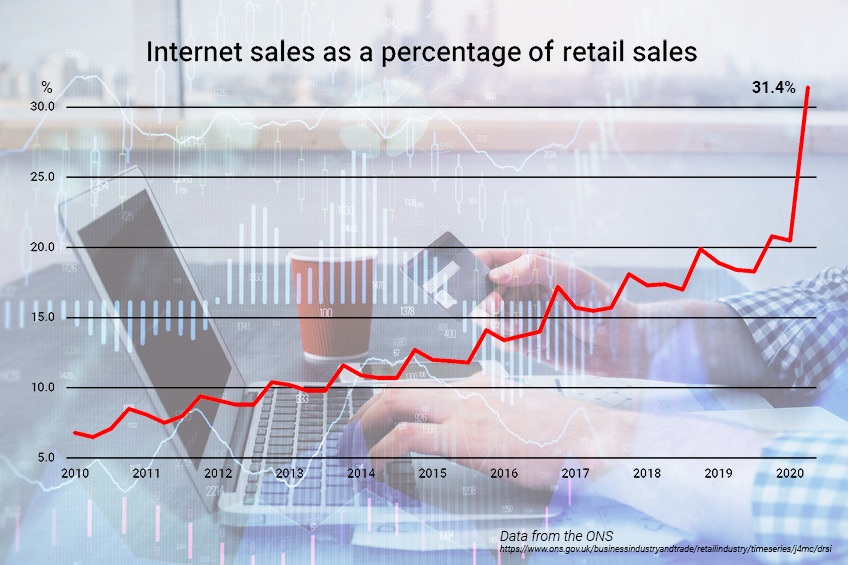
When it comes to the retailer's viewpoint, the eCommerce website overcomes regional limitations. The seller cannot reach out to large customers in a physical shop. They can, however, transcend geographical boundaries with eCommerce.
Second, through an eCommerce platform, retailers may use search engines to attract new customers. With a physical store, the branding is entirely dependent on word of mouth and other promotional offers. However, with eCommerce, search engines put in a stream of traffic. One can also keep an eye on the purchasing patterns of customers.
Last but not least, inventory management is becoming less costly. Since eCommerce automates the inventory management system, the operating costs of setting up multiple warehouses are greatly reduced. It is possible to perform sales using eCommerce even though you do not have any inventory on hand. For physical stores, however, this is not feasible.
With the growth of eCommerce trends, the number of eCommerce software applications on the market has increased. If you're looking for the best eCommerce tools, you'll come across plenty of other options, including Odoo eCommerce, Magento, Shopify, BigCommerce, OpenCart, and a few others. Each application promises to provide useful tools for selling products online. However, keep in mind that selecting the right and best eCommerce tools will only allow you to thrive in a sea of fashionable stores and earn a profit.
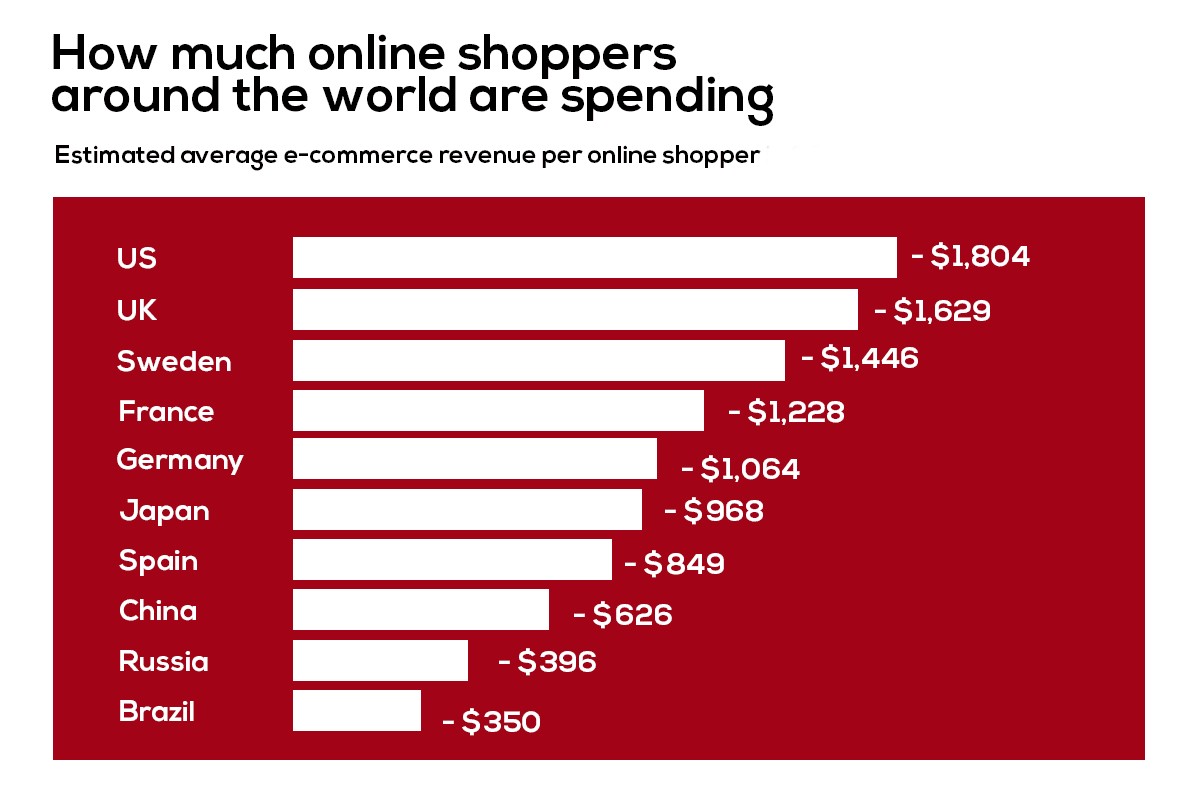
This also goes to show how important it is to have your own eCommerce store to attract customers. As previously mentioned, there is a multitude of eCommerce tech options on the market that promise out-of-the-box solutions for selling goods online like it's a walk in the park.
If you look at them from different angles, you might assume that all of the solutions are the same. They may not be, however. Each software can vary from the next in terms of pricing, ease of use, design versatility, and value for money.
So what is the best way to select the best eCommerce software?
Choosing the right eCommerce software is often difficult because there are so many factors to consider, such as pricing, features, scalability, user-friendliness, and so on. However, you must consider the following elements to ensure your eCommerce store's exponential sales rise.
Search Engine Optimization (SEO) Compatibility
Mobile Compatibility
Protection and Security Features
Scalability of the Platform
System for Product Management
Order Management Framework
System for Return Management
Integration of multiple networks
Option for Multiple Payments
With so many eCommerce platform options on the market, each offering something different, you're stuck deciding what to choose and how to use it. You do not need all of the features mentioned in the app, but you cannot ignore the vast majority of them. As a result, selecting the best eCommerce framework is solely dependent on your knowledge of your business's specifications.
The most important thing to do before selecting an application is to consider the business requirements.
In the industry, there are primarily two types of eCommerce applications:
a) A software-as-a-service (SaaS)-based eCommerce platform
b) E-commerce platform that is open-source
The SaaS eCommerce platform is well-known for its speed and ease of use. It does not necessitate any coding skills or a technical team to create the program. Users can easily sign up and set up their online store using the ready-made application that is hosted online. The downside of using SaaS-based eCommerce is the high recurring expense. With the extension duration, the price will rise exponentially. Furthermore, you will not have the option of customizing the application to meet your specific needs. You must be happy with the current functionality and fully depend on the vendor to resolve any issues.
However, You won't have any problems if you use open source.
When you choose opensource eCommerce software, you get source code and complete control over your eCommerce website and business. In comparison to SaaS, users should expect greater scalability and customizability from the framework. It is possible to micro-personalize a website using an open-source eCommerce framework by using various other modules.
As a result, you can rest assured that you've chosen the best eCommerce software for your business. If your website needs an external payment gateway, for example, you can simply install a module and make the option available in your application. With opensource eCommerce, it's as easy as that.
The Top 5 Opensource eCommerce Platforms in 2021:
1. Odoo eCommerce
2. Magento
3. Prestashop
4. Drupal Commerce
5. Open-Cart
Odoo eCommerce vs Magento
Odoo and Magento, two main eCommerce software applications, are discussed in detail in this blog. We'll look at how they vary in terms of pricing, design, features, and customer service, among other things. At the end of the day, you'll be able to pick between the two.
This article is for you if you're thinking about starting your own online store and are searching for the right eCommerce application.
Many of the features we discussed earlier should be included in the best eCommerce application. It's not just that having a "Buy" button for customers to purchase your products makes your eCommerce software valuable and efficient. Many features should be included in the eCommerce framework to keep inventory, accounts, marketing, and other aspects in check.
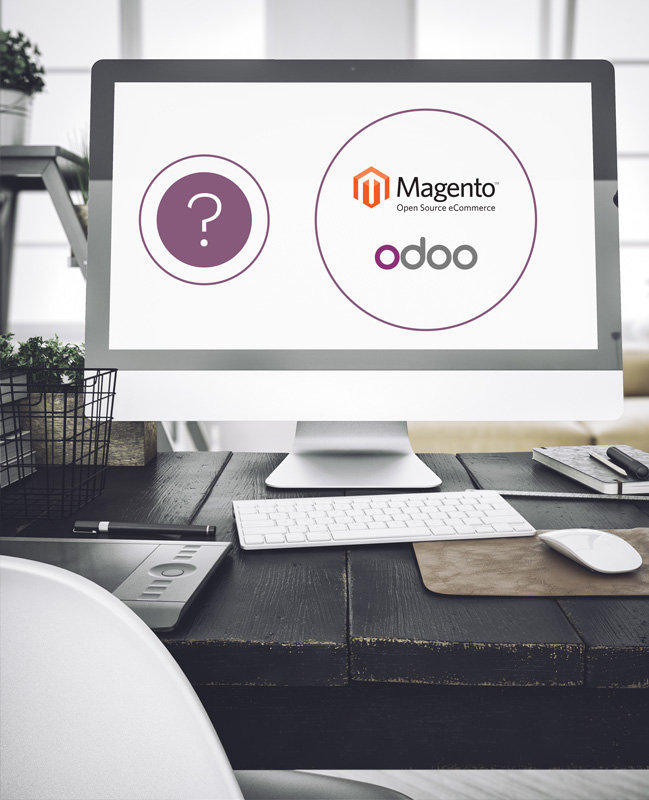
The eCommerce platform should, above all, be user-friendly. Customers will return more frequently if the site is easy to use, which will result in increased sales.
Without further ado, let's take a look at how Magento and Odoo can help you increase your sales.
Magento is unquestionably the king of eCommerce software. With its own charms and fancies, the application quickly became a success in the eCommerce industry. Magento came with a beautiful and practical design to attract consumers and quickly build a large customer base for themselves.
Although it continued to win its share of acclaim, such as more than 250K Magento installs, new entrants were welcomed with ease. The Odoo ERP is one such contender to be reckoned with. Although Magento and other eCommerce platforms focused on their own front-end systems, Odoo emerged with an integrated business management system for managing online stores.
Odoo is so self-sufficient and stable that it removes the need for any standalone business applications to handle sales, clients, orders, accounting, inventory, marketing, and so on. Regardless of the size or complexity of the organization, Odoo provides a robust and straightforward management framework for all business processes, including eCommerce, accounting, inventory, customer relations, distribution, human resources, and purchase. As a consequence, your company's backend process will be very good. All with Odoo is easy to automate, from finding a potential client through CRM to verifying his sales order and timely delivery of products. There is no need to rely on a standalone application to keep track of stock changes, inventory quantities on hand, or product movement. All is orchestrated and started in real-time with Odoo.
As a result, you might argue that even Magento has a sophisticated backend. However, it is important to remember that Magento's advanced backend is only for eCommerce-related functions such as order and catalog management. Users must, however, purchase Magento extensions at great rates in order to handle the company's inventory, accounting, or purchasing. Odoo, on the other hand, sells them for a lower price.
In comparison to Magento, this has made Odoo a more cost-effective application. Odoo's cost-effectiveness has helped a wide range of companies, from small medium enterprises to large ones. The integrated Odoo suite promises robust eCommerce management, powering up with a slew of out-of-the-box features at a fraction of the cost. Odoo, with its additional custom-built modules, ensures that no detail is overlooked, and it covers every aspect of an eCommerce enterprise, including inventory management, accounting, marketing, and so on.
Are you really not convinced? Continue reading...
Odoo eCommerce vs Magento Feature Comparison
Product Management
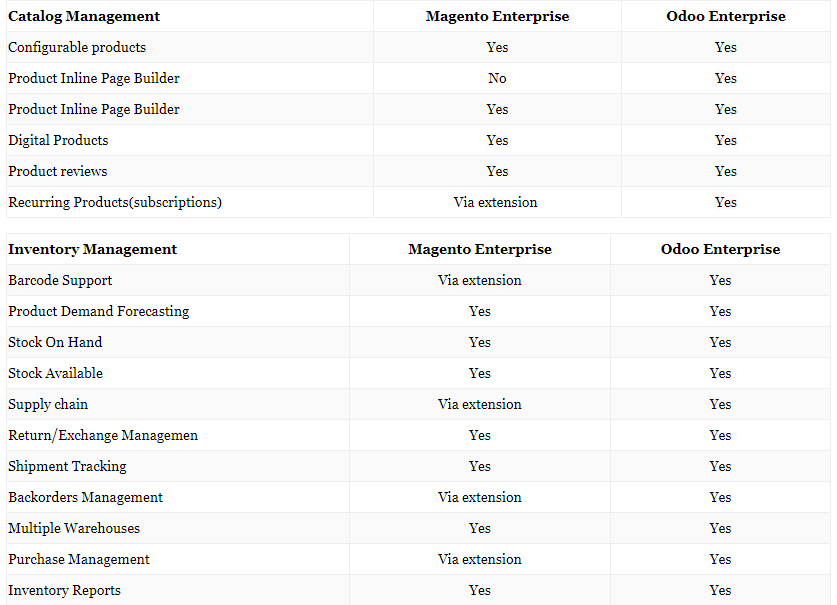
Design
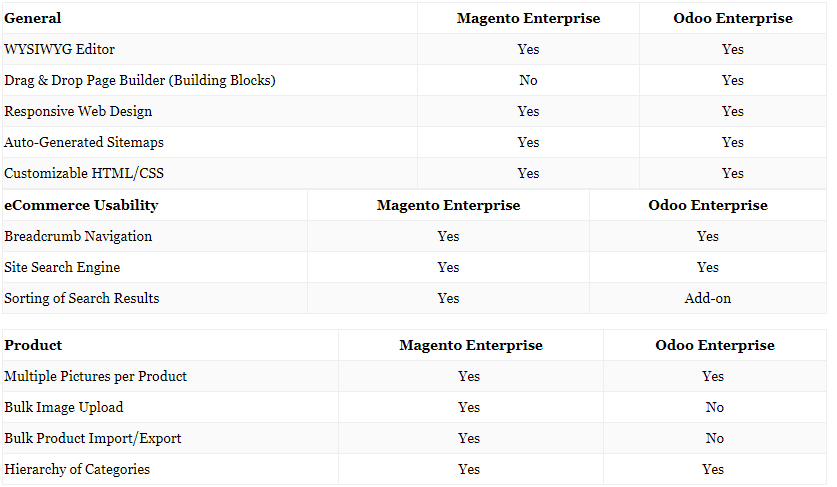
Customer Management
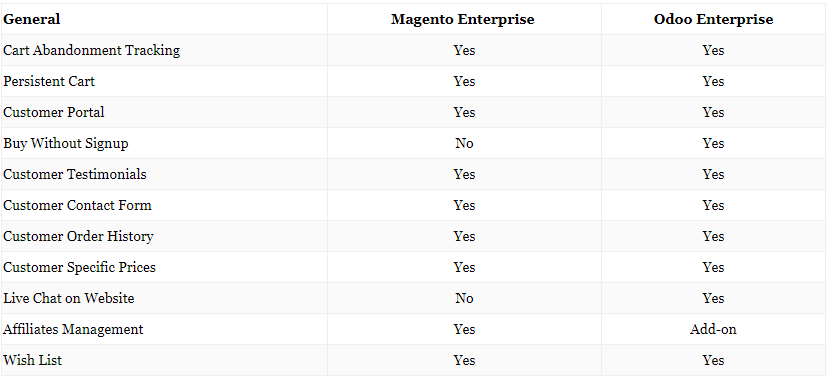
Shipping
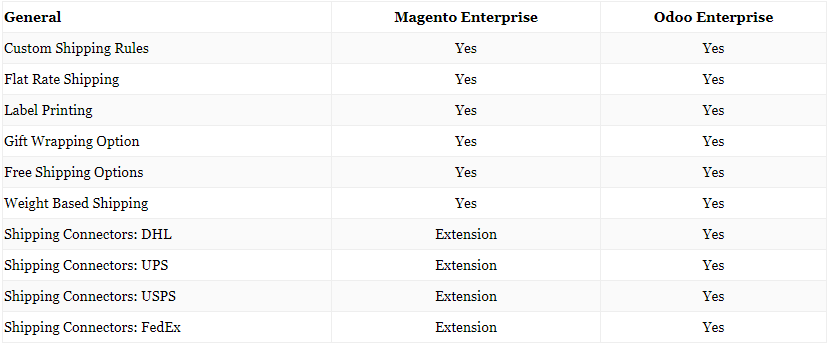
Promotion and Marketing
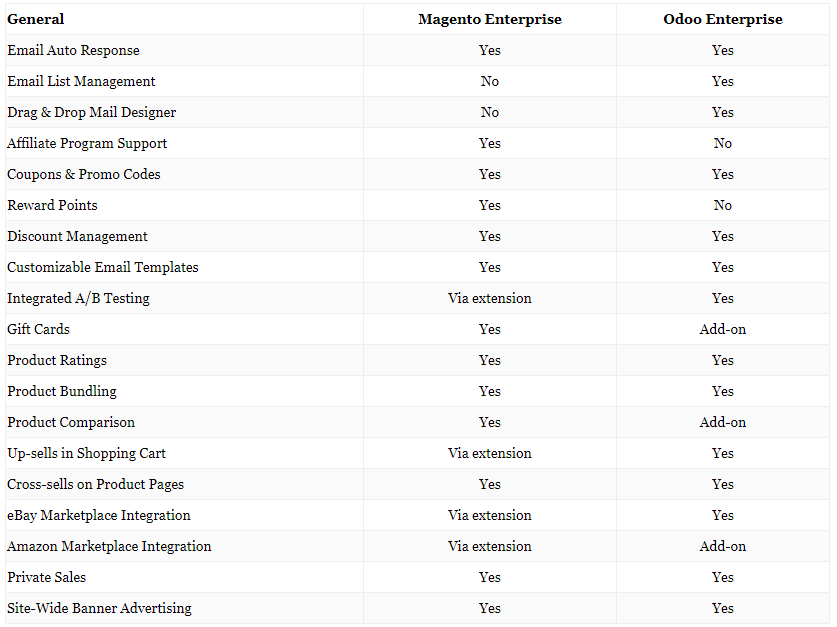
SEO (Search Engine Optimization)

SALES MANAGEMENT
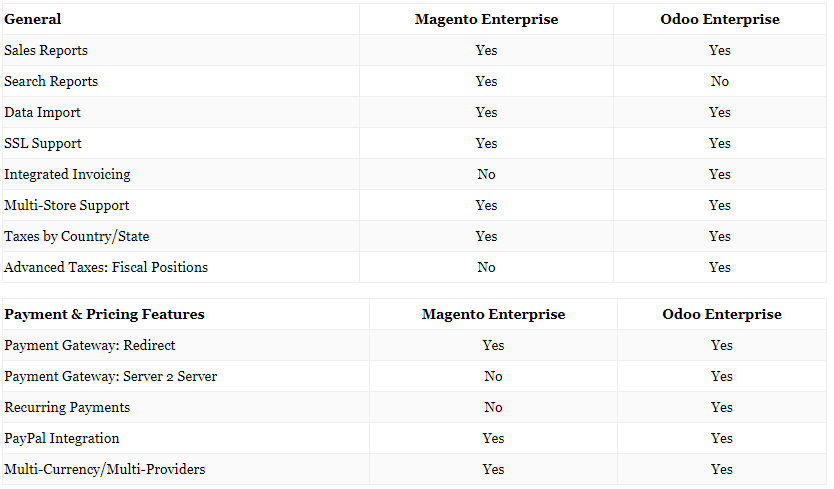
Reporting
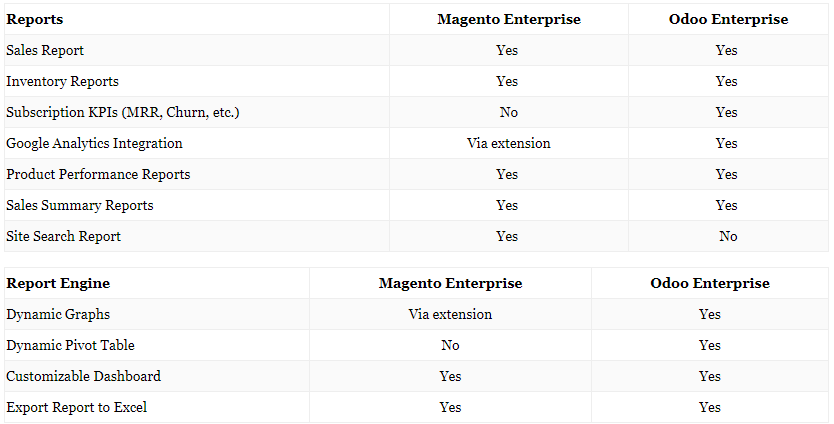
PRODUCTIVITY AND USABILITY
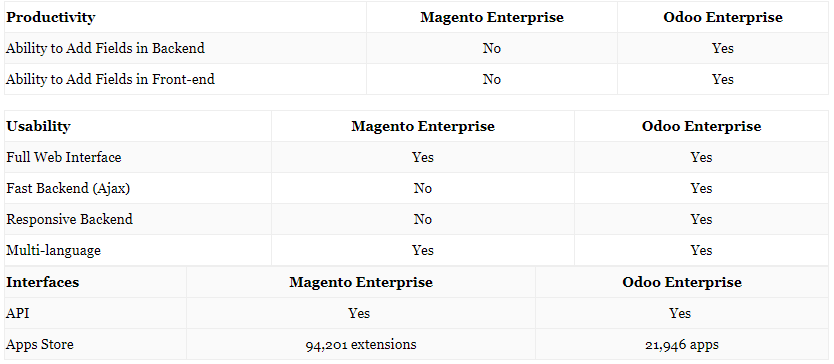
Odoo ecommerce vs Magento Odoo ecommerce vs Magento Odoo ecommerce vs Magento Odoo eCommerce vs Magento
It is apparent that Odoo outperforms Magento in terms of features.
Odoo positions itself as a full all-in-one enterprise suite, while Magento caters primarily to the needs of the eCommerce industry. Odoo caters to the needs of the eCommerce industry while also overseeing other company activities such as accounting and inventory. Odoo's set of vast built-in applications enables it to handle difficult business operations like accounting and analytics without the need for additional plugins. When it comes to back-office and operations management in Magento, we often need to deploy additional modules. Odoo, on the other hand, does it by default. You'll also have access to all necessary resources, such as product comparisons, promotional tools, multi-currency, multi-language, and other out-of-the-box solutions. When comparing Odoo and Magento, these features of Odoo outweigh Magento's limitations.
Odoo eCommerce vs Magento
Which eCommerce software is easier to set up?
When it comes to usability, Odoo has the upper hand over Magento. When compared to the above, Odoo is much easier to set up and use. The eCommerce website can be built and aligned seamlessly using several modules available in the Odoo app store.

Odoo's website builder's incredibly simple drag-and-drop building blocks enable users to create their own website without requiring much technical assistance. To micro-personalize your website, however, you can need the help of Odoo developers who are well-versed in both technical and functional knowledge. When it comes to developing an eCommerce website, the value of UI/UX is immense.
The benefit of using Odoo ERP is that you have access to a large group of qualified, trained, and experienced Odoo developers. These developers have access to a variety of tools, such as documentation and community forums, which aid in the rapid resolution of critical issues. Hiring Odoo developers from a reputable and trustworthy Odoo partner would certainly provide you with business growth benefits.
Cost Comparison
The cost of implementing Odoo and Magento is determined by the platform chosen, which can be opensource or closed. Both Odoo and Magento's opensource versions will be very simple and will lack many of the functionality that an eCommerce app must-have. Users who prefer the enterprise version, on the other hand, can gain access to advanced features such as integrations, SEO friendliness, and more. When it comes to pricing, both Magento and Odoo are open-source and free. Enterprise license fees, on the other hand, vary between Odoo and Magento.

Although Magento Enterprise licensing costs start at $18,000 per year, Odoo Enterprise licensing fees vary depending on the number of users and features. It costs $130 per user per year. Users can also sign up for a free trial of Odoo's enterprise version. This facilitates the application's decision-making process.

Conclusion: Odoo eCommerce vs Magento
Despite the fact that Magento appears to be the market leader in eCommerce applications, Odoo is a strong competitor. Odoo has rapidly caught up to Magento, completing all of the front-end functionality that Magento is renowned for. The upstart competitor, on the other hand, firmly supports robust functionality (backend) for the intrinsic management of eCommerce businesses. Odoo offers great management features, from having a solid and secure forum to maintaining the website's SEO friendliness. Magento will face a serious challenge in the near future.
Furthermore, a massive developer community is actively working on the open-source ERP framework, constantly developing its design and extensibility to keep up with Magneto's speed.
Odoo eliminates the need for businesses to rely on costly extensions and standalone applications. Odoo eCommerce is already integrated with the ERP's other modules. And this poses a serious threat to Magento.
Magento can be a good option if your eCommerce store's requirements are very small and don't need a large number of integrations. Odoo, on the other hand, is a viable option if you want a lot of integration options. Odoo is more open to integrations and customizations than Magento. Odoo's features can easily be expanded by integrating the platform with third-party apps. Odoo's extensive API library and web service make almost every Odoo integration possible.
Finally, with no license fee for Odoo Group, Odoo eCommerce will continue to be a viable option for small businesses looking to open their own online stores without breaking the bank.
If you're interested in implementing Odoo in your business, please contact us at sales@erpxcloud.com. We can guide your business toward high profits and efficient management with the aid of Odoo.
Latest Posts
50,000+ companies run Odoo to grow their businesses.
Join us and make your company a better place.



Odoo eCommerce vs Magento